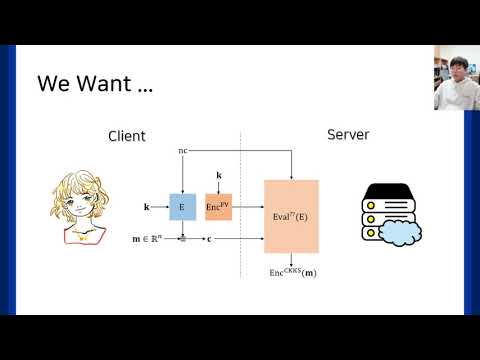CryptoDB
Transciphering Framework for Approximate Homomorphic Encryption
| Authors: |
|
|---|---|
| Download: | |
| Presentation: | Slides |
| Conference: | ASIACRYPT 2021 |
| Abstract: | Homomorphic encryption (HE) is a promising cryptographic primitive that enables computation over encrypted data, with a variety of applications including medical, genomic, and financial tasks. In Asiacrypt 2017, Cheon et al. proposed the CKKS scheme to efficiently support approximate computation over encrypted data of real numbers. HE schemes including CKKS, nevertheless, still suffer from slow encryption speed and large ciphertext expansion compared to symmetric cryptography. In this paper, we propose a novel hybrid framework, dubbed RtF (Real-to-Finite-field) framework, that supports CKKS. The main idea behind this construction is to combine the CKKS and the FV homomorphic encryption schemes, and use a stream cipher using modular arithmetic in between. As a result, real numbers can be encrypted without significant ciphertext expansion or computational overload on the client side. As an instantiation of the stream cipher in our framework, we propose a new HE-friendly cipher, dubbed HERA, and extensively analyze its security and efficiency. The main feature of HERA is that it uses a simple randomized key schedule. Compared to recent HE-friendly ciphers such as FLIP and Rasta using randomized linear layers, HERA requires a smaller number of random bits. For this reason, HERA significantly outperforms existing HE-friendly ciphers on both the client and the server sides. With the RtF transciphering framework combined with HERA at the 128-bit security level, we achieve small ciphertext expansion ratio with a range of 1.23 to 1.54, which is at least 23 times smaller than using (symmetric) CKKS-only, assuming the same precision bits and the same level of ciphertexts at the end of the framework. We also achieve 1.6 $\mu$s and 21.7 MB/s for latency and throughput on the client side, which are 9085 times and 17.8 times faster than the CKKS-only environment, respectively. |
Video from ASIACRYPT 2021
BibTeX
@inproceedings{asiacrypt-2021-31366,
title={Transciphering Framework for Approximate Homomorphic Encryption},
publisher={Springer-Verlag},
doi={10.1007/978-3-030-92078-4_22},
author={Jihoon Cho and Jincheol Ha and Seongkwang Kim and Byeonghak Lee and Joohee Lee and Jooyoung Lee and Dukjae Moon and Hyojin Yoon},
year=2021
}

